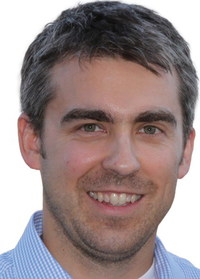Nearly five years ago, reporter Kara Swisher labeled Michael Dearing the “hottest angel investor you’ve never heard of.”
Things haven’t changed much. Dearing, a former senior VP at eBay who joined Stanford’s faculty in 2006 as a consulting associate professor (he also teaches off campus), has quietly backed a long string of highly successful companies. Think AdMob, the mobile advertising start-up acquired by Google for $750 million in late 2009. Or Aardvark, the social search engine, also acquired by Google, for $50 million 2010. Dearing had another big win just this month when Acompli, a 1.5-year-old maker of a mobile email application, sold to Microsoft for $200 million in cash. It had raised just $7.3 million from investors, including Dearing’s investment vehicle, Harrison Metal.
Despite keeping a low profile, Dearing nicely agreed to chat with us recently about a few things, including who he thinks is the best early-stage tech investor in the business today. From that interview:
There’s been increasing chatter in the Valley about diversity in startups and investing, as well as the moral actions of companies. What strikes you most about the ecosystem in 2015? What’s healthy and what’s unhealthy in your opinion?
On the “healthy” list: continued inbound immigration — international and domestic — of exceptional people; circulation of talent from company to company; and bio-diversity of products being created. The “unhealthy” list for Silicon Valley is the same as for Earth. Sometimes people treat each other terribly. Sometimes fear and status anxiety creates a zero-sum thinking. But it’s a self-cleaning oven. What I mean is that the stuff on our “healthy” list eventually, inevitably overcomes the stuff on our “unhealthy” list. [It happens] slower than I’d like, but I’m an optimist, I guess. This is the world capital of our Industrial Revolution, so of course good will win!
As a long-time seed investor, what have been the biggest changes you’ve seen in how companies get off the ground?
Today, there’s an ample supply of money, ideas and talent. I think we’re short on great general management. Gears grind when people struggle to make a business work. Get everyone working on the right stuff. Make sure we set goals and hit them. All the stuff Andy Grove talks about in High Output Management. But it’s an old issue. The scarcest input in our system right now has been in short supply for 200-plus years of industrial capitalism — exceptional general management. That means stuff is harder than it needs to be, things take longer, the runway gets eaten up faster than it should. If we fix that, we can massively amplify the power of our talent, good ideas, and money. That’s why great general managers are so important. That’s where I am steering Harrison Metal.
What’s your view on hot, high-growth companies staying private longer?
I think it’s a good thing when founders have options. Obviously there’s risk on pricing. Will the companies grow into the valuations? I hope so. Where you get into trouble is in the high-flying private deals where the leadership takes out a ton of money in secondary sales. Especially if those companies face a shortage of great general management. Stuff goes sideways really quick when the business is run poorly and the leadership is prematurely rich.
You’ve been in Palo Alto for years, but the center of gravity for many consumer and some B2B startups is now in San Francisco. How has Palo Alto changed for you, and have you ever thought about moving to the city?
I love Palo Alto. We have Stanford, the sun, things like that. I spent eight years teaching at Stanford and my home is here. I don’t think of it as an “or” — PA versus SF. They are each part of the whole, and I spend a lot of time in both places. PA has changed a ton, though. When I started Harrison Metal, I used to be able to walk around PA and see a good chunk of the portfolio. But today it’s not that way. Maybe it will be again someday. Until then I, for one, affirm loyalty to my Palantir overlords.
You’re not one to appear often publicly or promote yourself, so I’m curious: Who is one early-stage investor who founders should get to know, and what have you learned by working and co-investing with this person?
The very best early-stage investor in the business is Steve Anderson [ofBaseline Ventures]. His track record is exceptional, obviously — and he’s well known for it — but I mean “best” in the broadest sense. Tells the truth. Focuses on making the pie big first. Crazy supportive of his founders in good and bad times. He’s honest and hard-working. He’s the very first person I would go see if I were raising money. There are some truly exceptional people in the early-stage business, but he’s at the top of my list.
Semil Shah is a guest holiday contributor to StrictlyVC. Shah is currently working as a venture advisor to two funds, Bullpen Capital (which focuses on post-seed rounds) and GGV Capital (a cross-border U.S.-Asia fund). You can follow him on Twitter at @semil.


